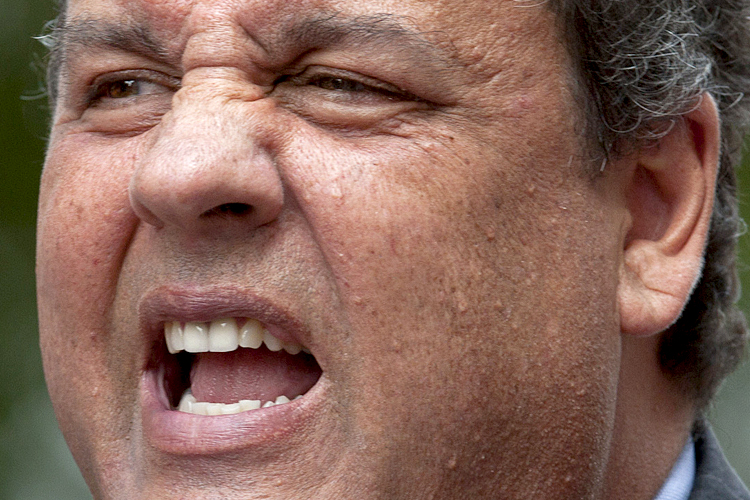SAYREVILLE, N.J. — Before Gov. Chris Christie began his town hall late Thursday in this working-class community hard hit by Sandy, something else happened first.
Two representatives from the Working Families Alliance, a grass-roots organization with labor backing, say they were ejected. Since “Bridgegate” broke nationally, the group has vowed to use Christie’s forums to raise questions about the scandal and the Christie administration’s Sandy response.
Giancarlo Tello, a WFA organizer, says after he and a colleague were screened by police, they started handing out fliers but were told they had to leave by an event staffer.
On the WFA website viewers are still being asked to sign a petition calling for the resignation of Christie ally and former attorney general) David Sampson from his chairmanship of the Port Authority. Samson turned his resignation in to Christie on Friday and it was effective immediately.
At a Friday press conference, his first since his January marathon, the governor downplayed any connection between Samson’s quick exit and the latter’s refusal to cooperate with Christie internal “fact-finders.” Nor was there any mention of a federal probe into Samson’s work with his law firm clients who also were beneficiaries of hundreds of millions of dollars in Port Authority contracts.
Nothing to see here, just the orderly and collegial passing of the torch. Unlike the summary firing of former deputy chief of staff Bridget Kelly, someone of “General Sampson” stature deserves a dignified send-off for his years of public service.
This very same day the Asbury Park Press had on its cover the results of a poll it conducted with Monmouth University, which prompted the paper to ask in a headline “Has Tide Turned for Christie?” The polls found that Christie’s “approval free fall” was slowing, with a 51 to 41 split to his advantage. The same poll had found in February the governor’s approval rate had dropped by double digits.
So did the governor’s hand-picked, million-dollar, outside counsel exoneration and his media blitzkrieg proclaiming it work? While the report was roundly dismissed by Op-Ed writers as a transparently self-serving waste of taxpayer money, it did put Christie’s name in the same sentence as “exoneration.” In the era of the 10-second sound bite, that’s not without political utility.
Meanwhile, Christie had good news for the locals at the town hall. The state, thanks to federal support, had made offers to buy out 190 homeowners who have experienced catastrophic flooding year after year. One hundred and twenty-one homeowners had accepted the offer. Four homes had already been demolished last month.
All totaled the state will use $300 million to buy 1,300 homes in places hard hit by repetitive flooding. Environmentalists say that is only a drop in the bucket in a state where overdevelopment has resulted in the Garden State losing more than 40 percent of its original wetlands. In the Passaic River Basin alone, 6,000 homes are vulnerable to chronic flooding.
At his 117th town hall meeting the crowd of 350 in the St. Stanislaus parochial school were grateful, with one testimonial after another from Sandy survivors who thanked Christie for his Sandy response.
This was one of the first places Christie came by helicopter the morning after Sandy’s 7-foot-high storm surge sent sofas and freezers floating while residents frantically struggled to keep their heads above water. Many of those iconic photos of Christie in his blue signature fleece embracing distraught and traumatized Sandy victims were taken here.
Meanwhile, Christie promised the Sayreville crowd that by the summer of 2016, thanks to the Army Corps of Engineers, the state would have in place “a protective dune system” that would run along the Jersey’s Atlantic coastline from as far south as Cape May all the way up to the Raritan Bay where Sayreville sits.
“We are working on dredging other waterways as well to make sure that we are better prepared for the next storm,” he pledged.
There were skeptics in the crowd. Longtime resident and Sandy victim Frank Mazzaroni did much of the repair work on his home himself but says he has been tortured by the bureaucracy. “They are helping us out. It is like breaking your leg, going to the hospital, they give you a cast, and they give you one crutch to go home with,” Mazzaroni says.
As far as buttressing the entire state against the ravages of another Sandy, Mazzaroni says the coastal dune system Christie is relying on is only part of the solution.
Mazzaroni correctly points out Sayreville was hit not only from the coastal storm surge but from massive inland runoff from sprawl developments that paved over wetlands. “Houses were put where they shouldn’t be and other people were affected and now they are going to give us a band-aid,” Mazzaroni says.
Mazzaroni says, historically, each town pushed for its development without a regional awareness of the impact their choices had on downstream communities. Without a change in that ethos the state will remain vulnerable to Sandy-like extreme weather events.
For Debbie Mans, executive director of the New York/New Jersey Baykeeper, the lack of an integrated regional post-Sandy strategy is evident between both New York and New Jersey.
Mans says that in New York, Gov. Andrew Cuomo has fully accepted that global warming is happening and that as a consequence sea levels will rise and the region will see more extreme weather events like Sandy. “Here in New Jersey, the climate change office was dismantled,” Mans says.
Historically, Christie has been cool to regional solutions to environmental challenges. In 2011 he pulled New Jersey out of the 10-state Regional Greenhouse Gas Initiative to lower carbon emissions. Fellow Trenton Republicans offered him some cover by complaining the cap and trade approach drove up the cost of energy for consumers.
Last month a New Jersey Appellate Court ruled Christie had broken the law with his unilateral move because there was no opportunity for public comment.
Perhaps the governor would preside over a town hall on that topic?

